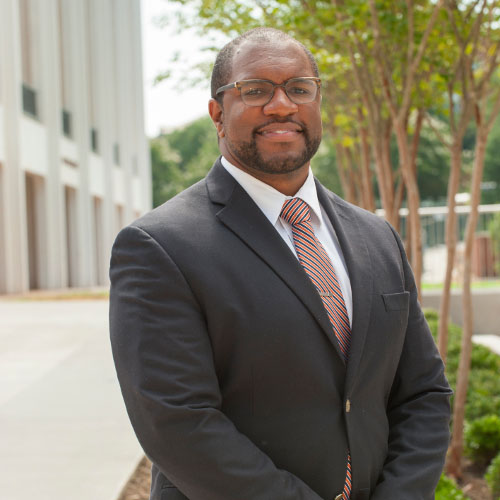About
Dr. Gilmore earned a B.S. in Electrical Engineering from The Citadel, Military College of South Carolina in Charleston, SC in 2010. While playing linebacker for the Bulldog football team,Dr. Gilmore developed a passion for applying his electrical engineering skillset to medically-based challenges. After graduation and a short stent in industry as an automation engineer at Nucor Steel Berkeley (Charleston, SC), Dr. Gilmore joined the Clemson Bioengineering Department as a PhD student. As a graduate student, Dr. Gilmore was selected to be a Call Me Doctor™ Fellow and became the program’s first graduate. His dissertation research focused on the development of woven polymeric scaffolds for critically-sized bone defects. Using a variety of textile techniques for fabrication and characterization, he evaluated various scaffold geometries for their effect on osteogenesis. Upon graduation, Dr. Gilmore became a Clemson Pathways Fellow, in Clemson’s department of Mechanical Engineering. Here he focused on developing a centrifugal microfluidic platform for the separation of pathogenic cells from heterogenous cell populations using yield-stress responsive Bingham plastic materials. Dr. Gilmore rejoined the Clemson Department of Bioengineering as an Assistant Professor in August 2017. In addition to directing the Sensors, Materials, and Analytics for Regenerating Tissues (SMART) Lab, Dr. Gilmore also directs the Call Me Doctor™ Program. His current research focuses on developing intelligent point of care diagnostic biosensors for chronic wounds. By combining his background in instrumentation, medical textiles, and machine learning, Dr. Gilmore hopes to develop tools uniquely capable of answering healthcare challenges in the 21st century.
Visit Dr. Gilmore's Faculty Profile.
How their research is transforming health care
Dr. Gilmore’s work in the development of intelligent biosensors for chronic wound diagnostics is situated at the intersection of traditional biomaterials and biosensing research and the emergence of big data analytics, particularly in the healthcare arena. This research is timely and has the potential to transform the treatment of chronic wounds because it combines the advantages of continuous wound monitoring and telemedicine for patients that traditionally struggle with continuity of care and compliance. Continuous monitoring of chronic wounds has the potential to provide insight into the progression of dangerous infection, to quantify the healing process which has been previously only understood qualitatively, and to alert clinicians to important developments in patient status even away from the clinic. Given the current healthcare landscape, and the need to maximize the efficiency of patient visits, telemedicine will become an increasingly important method of clinician-patient interaction. This technology has the ability to help clinicians track the progress of patients that traditionally may have struggled to be compliant with treatment plans, either due to lifestyle or challenges with access to the clinic. Dr. Gilmore’s research aims to use an interdisciplinary approach to improve wound healing outcomes through detecting, predicting, and treating infection and through more consistent clinical interaction to improve patient compliance.
News and media related to Dr. Gilmore’s research
- Clemson University Newsstand - "Wound warriors: Clemson University bioengineers aim to fight bacterial infections with new sensor"
- Clemson University Newsstand - "New undergraduate program seeks to expand and diversify the bioengineering workforce"
Health Research Expertise Keywords
Faculty Scholar, Biosensing, Chronic wounds, Diabetes, Neuropathy, Biomarkers, Infection, Antibacterial, Antibiotic stewardship, Telemedicine, Telehealth, Machine learning, Big data

